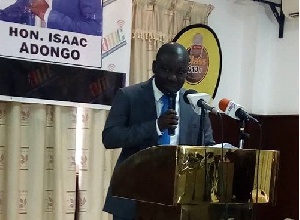Bolgatanga Central MP, Isaac Adongo, has endorsed the in-camera hearing of the collapsed bank saga by parliament’s Finance Committee with reason that a public hearing will adversely affect the banking sector.
Pressure group OccupyGhana had issued a statement advocating that the hearing be made public.
Seven banks: UT Bank, Capital Bank, uniBank, Sovereign Bank, The Royal Bank, The Beige Bank and The Construction Bank, collapsed within a spate of one year.
The first two went under in August 2017.
The other five went bust two weeks shy of a year after the first two failed.
UT Bank and Capital Bank were taken over by GCB Bank while the last five were put together by the Bank of Ghana to form the all-new Consolidated Bank Ghana Limited.
In total, the state is spending over GHS8billion of taxpayers’ money in rescuing the banks.
Parliament's probe of the collapsed banks started on Wednesday, 5 September 2018 but was boycotted by Mr Adongo as he said the necessary documents were not made available to committee members for a thorough probe.
Mr Adongo told Moro Awudu on Class 91.3FM’s Executive Breakfast Show on Thursday, 6 September 2018, that: “The level of confidence in the banking sector is at an all-time low [and] the last thing this country needs is for somebody like Adongo or for any of my colleagues to share a gloomy picture in the full glare of the cameras”.
He continued: “You may not like what people do at the banks, we wouldn’t want everybody to run to the banks due to a certain comment that could spark a certain wave of disaster for the [banking] sector. Therefore, even though we understand that we are in this difficulty, the focus should be to protect what we still have and we want to say that there is a problem with the way that people are running on our banks and it is up to us to encourage [clients] to keep their monies at the bank and the last thing we want to do is a public hearing that could lead to certain revelations that may end up jeopardising the whole system”.
He said: “In the absence of that, for transparency and all that, of course public hearing would have been good but the risk is just too high for the banking sector to be exposed to a public trial and I am not in support of a public trial”.
General News of Thursday, 6 September 2018
Source: classfmonline.com

















